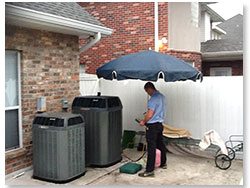
Humidity control was the problem that originally spurred the need for air conditioning. Lack of humidity control in hot, humid climates, in particular, can lead to mold growth and other moisture-related problems. High indoor humidity can lead to health and comfort problems.
Modern air conditioners dehumidify as they cool; you can see that by the water that drains away, but this dehumidification is incidental to their main job of controlling temperature. They cannot independently control both temperature and humidity.
In hot, humid climates such as ours, the incidental dehumidification that occurs may not always be enough to keep the indoor humidity conditions acceptable. The maximum dehumidification does not happen at the hot times of the year—when the air conditioner is running a lot – but rather, at mild times of the year when the air conditioner runs very little. Right now, our mornings are cool and your AC may be keeping the humidity under control but by the end of May, it will be hot enough that you may find that your AC can no longer keep up with the job of dehumidfication. A stand-alone dehumidifier may need to be added to your system to provide the additional capacity to remove moisture from the air – keeping your home cool and comfortable while protecting you from mold and mildew growth.
Here are some tips to lessen the need for dehumidification:
- Do not set your thermostat to the “fan on” position. In this position the fan blows air all the time whether your cooling system is running or not and one key impact is that a lot of the moisture your system just took out of the air, will be blown back into the house before it can drain way.
- Use exhaust fans during moisture-producing activities. Cooking, bathing, washing, and similar activities produce a lot of moisture inside the home. Exhaust that moisture directly outdoors using a fan. Similarly, avoid drying clothes indoors except with a clothes dryer that is exhausted directly outdoors.
- Do not open windows or use ventilative cooling when it is too humid outside.
While these tips are helpful, in our climate it is not likely they will eliminate the need for a separate humidification system. If you are concerned about excess moisture, mold and mildew in your home, give us a call today to discuss your options!




